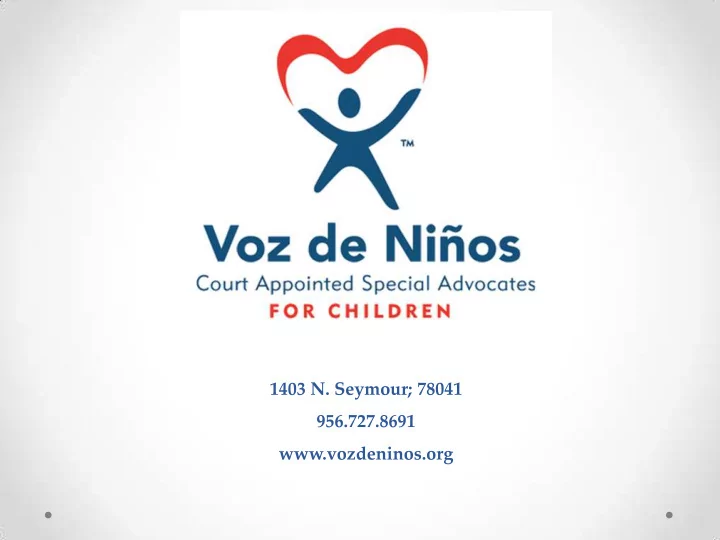

1403 N. Seymour; 78041 956.727.8691 www.vozdeninos.org
An Overview Court Appointed Special Advocates (CASA) volunteers work with children in foster care due to abuse, neglect, and/or abandonment. Since home is no longer safe, the Texas Department of Family and Protective Services takes charge of their well-being while mom and dad take time to rehabilitate. While parents are trying to stabilize their lives, the children have entered an overburdened child welfare system where they are now one among many.
Cont . The Texas Department of Family and Protective Services (DFPS) – Child Protective Services (CPS) unit works with family units to outline Family Service Plans. Parents need to demonstrate to the court and DFPS that they have addressed the issues that brought them and their children under the watch of DFPS. If parents have made the necessary changes to provide for their children, the families will be reunited. Parental rights can be terminated and children will remain in foster care with the state retaining “parenting rights” if parents do not make changes.
Cont. The cases CASA volunteers are appointed to are open cases that a judge is presently reviewing to determine whether mom and dad will be reunited with their children or if children will be placed up for adoption. Judges appoint CASA volunteers to watch over and advocate for abused and neglected children to make sure they do not get lost in the legal and social service system. Volunteers stay with each case until it is closed and the child is placed in a safe, permanent home. A CASA volunteer will be the one constant adult presence in a child’s life.
Voz de Niños advocates for the best interest of abused and neglected children in the court system through the training and support of community volunteers.
Court Appointed Special Advocates As the eyes and ears of the judge, Advocates provide the court a full picture of a child’s life and recommend what they think is best for him or her. CASA volunteers have that ability because they build a trusting relationship with the children under their care and come to know their wishes and needs. Advocates also work with family members, family friends, attorneys, doctors, caseworkers and other professionals to provide fact based recommendations to the court.
What are a CASA volunteer’s main responsibilities? Investigate – Advocates carry out an objective examination of the situation, including relevant history, environment, relationships, and needs of the child. Facilitation – Advocates identify resources and services for the child and facilitate a collaborative relationship between all parties involved in the case, helping to create a situation in which the child’s needs can be met. Advocacy – Advocates speak up for the child by making recommendations regarding the child’s best interest in a written court report. Monitoring – Advocates keep track of whether the orders of the court and the plans of CPS are carried out.
What children are assigned to CASA? Advocates are assigned to children who have been abused or neglected and need the Court’s protection - youth are all placed in foster care. A CASA child’s age can range from newborn up to age 17. How many children do CASA volunteers work with? All Advocates are assigned one case. The case can involve one child or a sibling group.
Who can be CASA volunteer? CASA volunteers do not have to be lawyers, social workers or a parent to advocate. No experience or special education is needed – just a desire to help and a willingness to speak up. Requirements • Must be 21 years of age or older • Must submit an application • Must attend a pre-training interview with a CASA staff member • Must provide two professional references and one personal reference • Must complete all CASA training • Must commit to at least one year of service
Time Commitment Since Advocates work with (and on behalf of) children, it is important that they stay long enough to make a difference. Voz de Niños asks that all volunteers commit to a minimum of a year. All cases are unique and some will require a shorter or longer commitment. Monthly: 10/15/20 hours - varies according to needs present. Training Face to Face Class Sessions - 20 hours Online Module – 10 hours Court Observations – 3 hours Total hours of training: 33 hours
Priscilla V. Garcia Executive Director director@vozdeninos.org Sara A. Cantu Advocate Supervisor sara@vozdeninos.org Juan M. Castro Program Support Specialist juan@vozdeninos.org
Recommend
More recommend